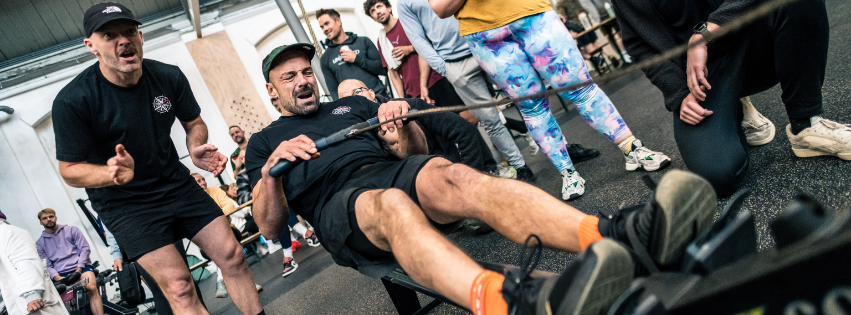
I encounter all sorts of people when coaching. They often have their career, relationship, hobbies and much more that need their attention, but once they have a child, they are faced with an extra challenge: The sleep deprivation of new parents. We all know that sports can be great for health, but how do you set up a postnatal fitness plan for yourself? Do you need a special ‘mommy fit’ program or can you train as normal? Do we need a young dad support group for those having trouble with not getting their regular, uninterrupted 8 hours of sleep?
Why does sleep deprivation matter?
Both sleep quality and quantity are important for a variety of reasons. It helps us process emotions, recover from our workouts and basically allows our brain to function well throughout the day. Less sleep because of your newborn - or at the very least interrupted, lower quality sleep – will have an impact on those things. Anyone who has ever had longer periods of less sleep, regardless of the reason, has probably experienced being a bit cranky, less able to focus or just being plain sleepy. This is completely normal, but one of the things impacted is, of course, your training.
Exercise combined with sleep deprivation
If a significant part of your recovery happens when sleeping, sleep deprivation impacts exercise recovery. Obvious, but what does that mean in practice? Usually, there are two big factors to keep in mind.
The first one is that you can recover from less volume. Volume means the total amount of work you do in training. Sometimes we count this as sets or reps per week for a muscle group, or it could be the number of workouts, or it could be the amount of things you do in one workout, and so on. Perhaps normally you could do 12 sets of heavy squats per week, spread out over 3 workouts and your legs would feel awesome. But now that you wake up several times a night, and sleep 20% less, suddenly you can only handle 10, 9, or 6 sets per week before you notice that your performance starts dropping. The problem here is that it’s hard to measure exactly. Your nutrition, stress levels and so on also have an impact on this!
The second factor is what we call ‘readiness to train’. That’s a combination of how ready are you physically AND mentally. If you are tired, you may be less motivated to push hard and have a harder time focusing on complicated, technical movements.
Health and training as a new parent
Does all this sound demotivating? Don’t worry! These things do not mean you are unfit to train or need a special training for mamas. It just means you need to learn how to autoregulate! Autoregulation may sound fancy, but it just means “adjust the workout to your recovery capabilities and readiness to train”. Maybe you go heavier or lighter. Maybe you take it easier during a workout or push a bit extra. If you can autoregulate your workouts, you can still reap all sorts of benefits from training. You can still get stronger legs, you can still improve your endurance, you can still learn new skills and you can still reap tons of health benefits! For both physical and mental health, exercise can be useful even if you’d cut your sleep in half. Some things are obvious, like endurance training being good for heart health. But did you know that frequent exercise helps with brain function, willpower and sticking to good nutrition habits? So instead of going for an all-or-nothing mentality and be demotivated by your lack of sleep, learn to autoregulate!
It’s all about setting realistic goals
Before we get to practical tips, it’s important to be realistic about your expectations when setting up a postnatal fitness plan. Perhaps instead of adding 10 kilos to your deadlift PR in the next few months, 5 kilos may be more realistic. Perhaps as a new mother, the focus might temporarily be on restoring the function of your abs before you worry about learning to do ring muscle ups. Yes, you can exercise just fine with sleep deprivation and still have your fun and progress, but do not expect to recover like a 17 year old genetic freak with few worries in their daily life.
.jpeg)
Your own postnatal fitness plan
Here’s a few tips to get you started!
1 – Training
Start with the basics: Is your previous goal still realistic? If you have plenty of time but “just sleep a bit less”, maybe not much has to change. But if you’re juggling your newborn baby (not literally!) with a fulltime career, severe lack of sleep and other stuff in life, you may have to go from “lots of progress” to “a little progress” or even maintaining your fitness levels. Maintaining costs A LOT less effort and time than building it up.
If you’re pressed for time and you have to choose between training or an extra hour of sleep, it can be hard to choose. As a general rule of thumb – if you can do 1 training session related to your goals per week, any additional sessions might be better substituted by an extra hour of sleep! The reason being that your strength levels or your CrossFit skills don’t just disappear over night. Doing it once a week could be enough to maintain whatever you have. Training more could be beneficial, but the training fatigue and lack of sleep stack!
So how do you know if you’re doing enough? What if you do want to train several times a week anyway?
Well, remember autoregulation? Strictly speaking, this is what coaches at UnScared always help you with. Should you go heavier/lighter? Should you do more/less? If you want to finetune this process, there is something you can do to finetune this process.
Log! Write down what you do and how much, and see how you feel, the next time the same exercise/muscle group/workout type comes by. Is your performance equal or improving? Great! Apparently, you can handle it. You can maybe add more sets, reps, push harder in a WOD or train more often. Are you so sore that you cannot get into a good deadlift starting position? Can you do fewer reps than last time? You probably haven’t recovered properly. Consider doing less, taking more rest days between training sessions or going lighter. Coaches can always give you some pointers to gauge your performance. Perhaps in a CrossFit class, a coach might tell you to use less weight in your deadlifts so there is more room for recovery while still having a good workout. For the same goal in strength class, a coach might tell you “to stay 3-4 reps away from failure” instead of going all out. This automatically autoregulates you, because it makes you go extra light. Using these principles, you can continually adjust your workouts to your ‘readiness to train’.
2 – Nutrition
“If you can’t do it the way you should, you should do it the way you can.”
Many factors negatively impact your recovery. Work stress, lack of sleep and bad nutrition are just three examples. Being tired more often might make it more challenging to be consistent with good dietary habits or methods of destressing. Instead of worrying about doing it perfectly -which is a fool’s errand anyway- do what you can, and ideally on autopilot!
Eating enough protein is important for optimally recovering, but instead of weighing every gram of peanut butter and making life unnecessarily hard, just eat an amount of protein equal to the size of your fist 3 times a day. Maybe 4 times a day if you want to build more muscle on top of ‘just being healthy’. Make sure you have easy access to those protein sources. Boil a bunch of eggs and keep them (peeled and in a container with water) in the fridge. Use protein powder. Prepare chicken, tofu or a meat replacement well in advance so you can just get it from the fridge/freezer and put it in the microwave.
.jpeg)
Do the same with vegetables and fruits – make sure they’re easily accessible and you’ll increase the chance of consistently eating them. Getting your protein, greens and fruits consistently gives you a healthy base to improve recovery, even if you’re busy and tired! If that healthy base is there and you eat decently most of the time, there’s no harm in getting some unhealthy stuff in once in a while – that’s negligible!
3 – Sleep hygiene
Sleep hygiene refers to the habits that help improve both quantity and quality of sleep. Again, do what you can! A cool bedroom, consistent bed times whenever you can, unwinding before you go to bed and eliminating all lights in your bedroom. None will fully compensate for the typical ‘new parent sleep deprivation’ but humans are adaptable. Get the basics right where you can, and you can still achieve a lot in training, or at the very least maintain your health and fitness!
If you’re an UnScared member and feel a bit overwhelmed with all this information or need help figuring out details – just send a message to info@unscared.fitness and we’ll see if there’s anything we can do to advise you through private coaching!




